119 books about 1225?-1274 and 6
start with M
119 books about 1225?-1274 and 6
119 books about 1225?-1274
6 start with M start with M
6 start with M start with M
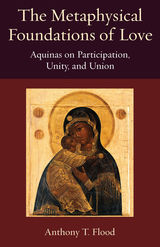
The Metaphysical Foundations of Love
Aquinas on Participation, Unity, and Union
Anthony T. Flood
Catholic University of America Press, 2018
The Metaphysical Foundations of Love: Aquinas on Participation, Unity, and Union offers a systematic treatment of St. Thomas Aquinas’s account of the metaphysical relations of unity-to-union and unity-to-participation in God as the key structuring elements to the nature of love and friendship. In general, Aquinas identifies love as the source and summit of the life of each human being. Everything in the created realm issues forth from God’s creative love, and the ultimate end of all human persons is the greatest possible union with God. Aquinas contends that the love of friendship allows for the greatest union between two persons; thus, the greatest union with God takes the form of friendship with him.
[more]
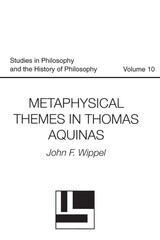
Metaphysical Themes in Thomas Aquinas
John F. Wippel
Catholic University of America Press, 1995
In this volume, John Wippel has collected a number of his essays dealing with Aquinas's metaphysical thought. The volume begins with a presentation and critical evaluation of certain twentieth-century attempts to describe the philosophical thought of Thomas Aquinas as a "Christian philosophy."
[more]
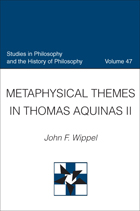
Metaphysical Themes in Thomas Aquinas II
John F. Wippel
Catholic University of America Press, 2007
This volume contains eleven articles and book chapters written by John Wippel since the publication of his Metaphysical Themes in Thomas Aquinas in 1984.
[more]
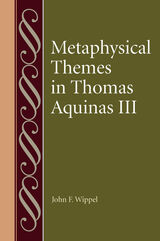
Metaphysical Themes in Thomas Aquinas III
John F. Wippel
Catholic University of America Press, 2020
Metaphysical Themes in Thomas Aquinas III is Msgr. John Wippel’s third volume dedicated to the metaphysical thought of Thomas Aquinas. After an introduction, this volume of collected essays begins with Wippel’s interpretation of the discovery of the subject of metaphysics by a special kind of judgment (“separation”). In subsequent chapters, Wippel turns to the relationship between faith and reason, exploring what are known as the preambles of faith. This is followed by two chapters on the important contributions by Cornelio Fabro on Aquinas’s distinction between essence and esse and on participation. The volume continues with articles on Aquinas’s view of creation as a preamble of faith, Aquinas’s much-disputed defense of unicity of substantial form in creatures, his account of the separated soul’s natural knowledge, and Aquinas’s understanding of evil in his De Malo 1. The volume concludes with an article comparing Bonaventure, Aquinas, and Godfrey of Fontaines on the metaphysical composition of angelic beings.
Most of these issues were disputed during Aquinas’s time by some of his contemporaries, and the proper understanding of each continues to be debated by various students of his thought today. Wippel’s purpose, therefore, is to help clarify our understanding of Aquinas’s thought on each of these topics, a task that requires the careful analysis of primary sources and of secondary literature and attention to the relative chronology of his writing.
[more]
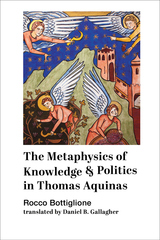
The Metaphysics of Knowledge and Politics in Thomas Aquinas
Rocco Buttiglione
St. Augustine's Press, 2020
Metafisica della Conoscenza e Politica in S. Tommaso d’Aquino was originally published in Bologna in 1985 by the Centro Studi Europa Orientale. This English translation has been prepared with the explicit permission and encouragement of Buttiglione. The work grew from a series of lectures Buttiglione gave on the relationship between metaphysics, knowledge, and politics based on a critical reading of Thomas Aquinas’s Commentary on Aristotle’s Politics and other relevant texts. His aim was to advance Thomistic thinking by incorporating the insights of modern philosophy on subjectivity and relationality.
In addition to its primary audience of philosophers, theologians, and political theorists, the book surprisingly enjoyed a wide general readership in Italy at the time of its publication. It represented an exciting attempt to harmonize medieval philosophy and the insights of personalism that had already had a deep impact on European intellectual life. Buttiglione was able to describe this attempt in a way accessible to a general readership, and in a way that confronted the political challenges Italy had been confronting for the last forty years.
Now, thirty-five years after the book’s initial publication, the conclusions Buttiglione draws from reading Thomas Aquinas’s commentary on Aristotle’s Politics––and the connections he makes between philosophy, theology, and political theory––are more relevant than ever. He argues that the traditional definition of “person” as rationalis naturae individua substantia––an individual substance or substrate (hypokeimenon) of a rational nature––“lacks that certain element that makes Augustine’s approach to personhood so appealing.” Hence Aquinas’s definition “is left wanting since it fails to elaborate on the crucial aspect of interpersonal relationship.”
The ingenuous way in which Buttiglione enlivens Thomistic political thinking with personalist philosophy helps to explain not only why free societies are more stable, tolerant, and respectful of human rights than totalitarian states, but theocratic ones as well. Only by raising the interpersonal aspects of political society to an ontological level—indeed, only by affirming and esteeming the self-transcendence of the human person as evidenced through ontological analysis—do the personal relationships that root and enliven the human person also lead to a realistic, dynamic, and convincing vision of the person’s real existence.
Buttiglione was startlingly prescient of the problems we confront at the beginning of the third millennium. This book will spark new discussions as it explains the importance of both the medieval tradition and twentieth-century personalism. The book also draws on a wide range of secondary sources unavailable to English readers that I and will have the unique ability to introduce readers to the “Italian” way of relating speculative and political philosophy in a relatively slim volume.
In addition to its primary audience of philosophers, theologians, and political theorists, the book surprisingly enjoyed a wide general readership in Italy at the time of its publication. It represented an exciting attempt to harmonize medieval philosophy and the insights of personalism that had already had a deep impact on European intellectual life. Buttiglione was able to describe this attempt in a way accessible to a general readership, and in a way that confronted the political challenges Italy had been confronting for the last forty years.
Now, thirty-five years after the book’s initial publication, the conclusions Buttiglione draws from reading Thomas Aquinas’s commentary on Aristotle’s Politics––and the connections he makes between philosophy, theology, and political theory––are more relevant than ever. He argues that the traditional definition of “person” as rationalis naturae individua substantia––an individual substance or substrate (hypokeimenon) of a rational nature––“lacks that certain element that makes Augustine’s approach to personhood so appealing.” Hence Aquinas’s definition “is left wanting since it fails to elaborate on the crucial aspect of interpersonal relationship.”
The ingenuous way in which Buttiglione enlivens Thomistic political thinking with personalist philosophy helps to explain not only why free societies are more stable, tolerant, and respectful of human rights than totalitarian states, but theocratic ones as well. Only by raising the interpersonal aspects of political society to an ontological level—indeed, only by affirming and esteeming the self-transcendence of the human person as evidenced through ontological analysis—do the personal relationships that root and enliven the human person also lead to a realistic, dynamic, and convincing vision of the person’s real existence.
Buttiglione was startlingly prescient of the problems we confront at the beginning of the third millennium. This book will spark new discussions as it explains the importance of both the medieval tradition and twentieth-century personalism. The book also draws on a wide range of secondary sources unavailable to English readers that I and will have the unique ability to introduce readers to the “Italian” way of relating speculative and political philosophy in a relatively slim volume.
[more]
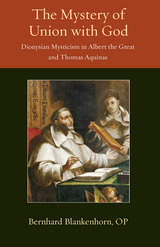
The Mystery of Union with God
Bernhard Blankenhorn
Catholic University of America Press, 2015
The Mystery of Union with God offers the most extensive, systematic analysis to date of how Albert and Thomas interpreted and transformed the Dionysian Moses "who knows God by unknowing." It shows Albert's and Thomas's philosophical and theological motives to place limits on Dionysian apophatism and to reintegrate mediated knowledge into mystical knowing. The author surfaces many similarities in the two Dominicans' mystical doctrines and exegesis of Dionysius. This work prepares the way for a new consideration of Albert the Great as the father of Rhineland Mysticism. The original presentation of Aquinas's theology of the Spirit's seven gifts breaks new ground in theological scholarship. Finally, the entire book lays out a model for the study of mystical theology from a historical, philosophical and doctrinal perspective.
[more]
READERS
Browse our collection.
PUBLISHERS
See BiblioVault's publisher services.
STUDENT SERVICES
Files for college accessibility offices.
UChicago Accessibility Resources
home | accessibility | search | about | contact us
BiblioVault ® 2001 - 2024
The University of Chicago Press









